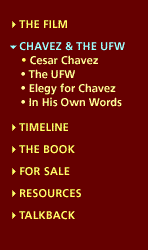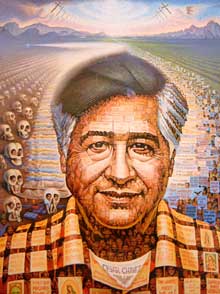 |

Presented by |
 |
 |


ELEGY FOR A HERO
By Douglas Foster
Thick brown dust swirls around my 11-year-old son and me, settling in the layer of sweat on our faces seeping into our clothes and coating our city-slick shoes. “It’s good we dressed up,” Jake says. tromping on. “Really good.”
 Painting by Octavio Ocampo
Painting by Octavio Ocampo
|
After a five-hour drive through the Central Valley of California, we’ve abandoned our car, because traffic is backed up for miles. We’ve set off walking, in the blistering heat, to the United Farm Workers of America compound at Forty Acres, just outside Delano.
In the distance, Cesar Chavez lies in an open coffin beneath a mammoth canvas tent. The muffled voice of a priest reciting the rosary wafts our way, the sound blaring one moment, then nearly extinguished.
I’ve been trying to explain to Jake why we’ve come. He has an ear cocked, but is also on guard as usual for 60’s nostalgia. Jake never met Cesar Chavez, and his childhood in the 1980’s lacked great social movements and political heroes.
When I ask if he admires any political leader, Jake says flatly: “Except for sports, nobody. I don’t think there are any people like that left any more.”
So I tell my son that when I first met Cesar Chavez I was a little older than he is now. It was the edge of summer in 1968 and I was part of a group of junior high school kids who had traveled from San Diego to Delano to deliver canned food and clothes we’d gathered for the striking grape harvesters. As soon as we arrived, we were hurried-off to a farmworker picket line, where we had paraded in the dust and heat for hours outside Delano City Council chambers. We marched to protest the jailing of a farm worker who had been beaten by a strikebreaker earlier in the day.
We dodged stones, spittle and epithets from local white teenagers who took special umbrage at the sight of city kids. They. gunned past us in dented pickups, shouting “Outside agitator! Commie! Fag!”
Our side prevailed that day. The jailed farm worker was released and there was a little celebration back at the union office. Chavez greeted us in a buoyant mood. As he stepped forward to shake my hand I remember thinking: But he’s so small He was quiet, demure even, speaking in a voice so soft you had to strain to hear him.
After all the shouted, hateful threats that had been aimed at us, Chavez’s calm was a salve. He carried himself with dignity, and his embrace that day felt like a benediction.
By the time I met Chavez, most of my other heroes had been shot down. Martin Luther King Jr. had been assassinated a month earlier and Robert Kennedy’s Presidential campaign would end in a pool of blood a few weeks later. But Chavez continued on, with his remarkable mix of militancy and nonviolence, using strikes, consumer boycotts and his own punishing fasts to publicize the cause. He would stitch together a global constituency across class and ethnic lines and live to build the first modern farm labor union on United States soil. Chavez became a beacon, drawing volunteers from all over the country to work for social justice In California’s agricultural valleys.
I’m struggling to explain this to Jake as we cross to the giant tent, surrounded by hundreds of farm workers and thelr families. The sun has set, a cool breeze has kicked up and a half moon is rising. Jake has slowed his pace, holding my hand and peppering me with questlons.
But there are chunks of the story I’ve left out, and I push on. I don’t want to describe Chavez as a one-dimensional symbol instead of remembering him as a real man. So I keep talking to Jake, stripping away the gloss of nostalgia in search of a fuller memory of the real man.
In the mld-1970’s, I turned down Cesar’s invitation to join the union and work on its newspaper. I decided that I wanted to become a journalist instead of a propagandist for anyone, even him.
As a daily newspaper reporter in the Salinas Valley in the late 1970’s, I chronicled the farm workers union’s boom — and then its bust. During those years, Chavez cut himself off at his compound in the Tehachapi mountains. He struck up a friendship with Charles Dietrich of the Synanon drug rehabilitation program and adopted some of Dietrich’s authoritarian methods. When a new generation of farm worker leaders emerged during the strikes of 1979 and 1980, Chavez slapped them down. In a series of purges, he drove many skilled and dedicated members out of the union.
Writing about these controversies was painful. Friends of the United Farmworkers often protested that I was revealing “internal matters” to the enemy. I can still remember Cesar’s icy, clipped voice on the telephone, in a conversation in which I was transformed for the first time from “Brother” to “Mister.”
Full of trepidation I tried to report the truth as I understood it, even when that meant angering the hero I admired.
“Do you understand what I’m trying to say?” I ask my son. “Yeah,” he replies soberly. “It’s like fighting your Dad when you think he’s wrong”
On the dais behind Cesar’s coffin, an indigenous troupe is dancing during a break between prayers. We’re moving down an aisle, surrounded by the cultural cacaphony Chavez represented. Rhythmic clapping builds to a crescendo as cries of “Si, se puede!” “Viva Cesar Chavez!” and “Viva la union!” alternate with prayers in Spanish and English and a hymn promising Chavez’s rebirth. “Resucitó resucitó,” a priest sings. When the Indian dancers replace the priest on stage, they chant, in counterpoint, “Chavez is made from corn. His soul is made of corn!”
Jake hangs back as we approach Chavez’s body and I walk on alone. The mourners move closer, and I can smell the sweet sap of hand-cut wood. A middle-aged man in front of me reaches out to rub the pine box’s fresh-hewn seams. He hovers over the short, waxy, well-coiffed man in the coffin.
When my turn comes I whisper “Cesar, I miss you. I’ve missed you for a long time.”
Rushing past the honor guard, I hurry to rejoin my son. I’m eager to have his hand in mine again. I’m torn between the urge to say more and the desire to close my mouth. The trip to Delano has been a kind of emotional striptease and I worry that I’ve already revealed too much.
In the course of a single day I’ve tried to give Jake a quarter century of my experience. Since he doesn’t have a hero of his own, I’ve and 1980, Chavez slapped handed over mine. But before he’s had a chance to revel in the thrill of adulation I’ve yanked this gift halfway back. Perhaps my insistence on telling a version of the whole truth has stolen from Jake the chance to view at least one person in a heroic light.
Outside the tent, electric generators bleat and huge overhead bulbs pulse In a jet-black night. I’m stumbling in the dark, eager to take one more run at describing the arc that crosses from my experience to my son’s.
I’m searching for a way to pass on, as best as I can, the story of a generation that once had many flawed heroes to my heir, whose generation has far too few.
Douglas Foster, the former editor of Mother Jones, lives in Chicago. This piece was originally published in the New York Times.
The UFW | Cesar Chavez Elegy | His Own Words | Timeline
|
  |

